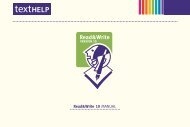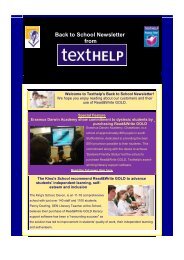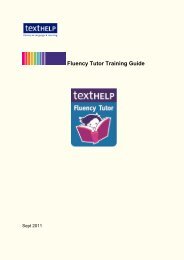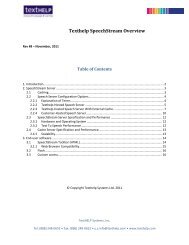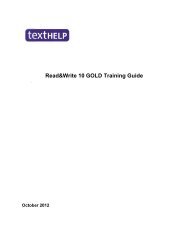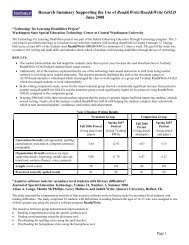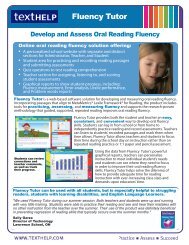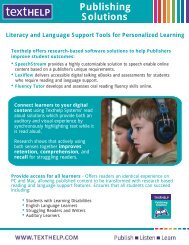01 NRDC Dyslexia 1-88 update - Texthelp
01 NRDC Dyslexia 1-88 update - Texthelp
01 NRDC Dyslexia 1-88 update - Texthelp
You also want an ePaper? Increase the reach of your titles
YUMPU automatically turns print PDFs into web optimized ePapers that Google loves.
Developmental dyslexia in adults: a research review 15<br />
respect to phonics and whole language (Carrier, 1983; Dudley-Marling & Murphy, 1997;<br />
Liberman & Liberman, 1992; Postman, 1970; Rayner et al., 20<strong>01</strong>; Stanovich, 1999). As<br />
elsewhere in politics, partisans tend to confuse values with facts. Even so, a mature science<br />
of reading instruction can reconcile the opposing positions (Beard & McKay, 1998); its basis of<br />
reconciliation will be an agreement that ‘to get started one may need phonics, to get fluent<br />
one needs practice, to keep practising one needs enjoyment’ and ‘to have enjoyment one<br />
needs a real book’ (Nicolson, 2002).<br />
It is a judgment of value—endorsed by the national strategy for improving adult literacy and<br />
numeracy skills, Skills for Life (DfES, 20<strong>01</strong>)—that people who struggle with reading, whatever<br />
the origin of their problems with reading, should be helped to read to the best of their ability<br />
and to adopt coping strategies where their reading ability proves insufficient for their social<br />
and economic well-being and personal fulfilment. It is an assertion of fact—critically<br />
examined in this review—that developmental dyslexia, stipulatively defined as a specific<br />
learning disability with a biological origin, largely accounts for the skills deficits of some adult<br />
literacy learners whereas the skills deficits of others are largely accounted for by experiential<br />
factors. A successful intervention policy for poor readers will avoid confusing facts with<br />
values. Both are important, but they are important in different ways.<br />
Either way, a general theory of adult reading skills problems is as likely a prospect as a<br />
general theory of holes. Even for deficits with a neurological origin, ‘given the complexity of<br />
the task and the kinds of capacities it involves, it would be very surprising if reading disability<br />
did not have multiple causes’ (Seidenberg, 1992). However, despite a common assumption to<br />
the contrary, not every reading skill deficit has a neurological origin, even though it<br />
necessarily has neurological consequences. There may be a parallel here with research in<br />
other fields of enquiry, where theoretical developments have been driven by cognitive<br />
neuropsychological models in which the disorder ceases to be simply a useful way of thinking<br />
about the world and instead becomes reified as something with an independent existence,<br />
which then needs to be explained as an innate psychological dysfunction caused by a specific<br />
brain abnormality (Sonuga-Barke, 2002).<br />
Yet, in addition to possible biological causes of reading difficulties, there are possible<br />
experiential causes (Bryant & Bradley, 1985; Cashdan, 1969; Chall, 1967; Chall et al., 1990;<br />
Clay, 1987; Cox & Jones, 1983; Ellis & Large, 1987; Gough & Tunmer, 1986; Jackson &<br />
Coltheart, 20<strong>01</strong>; Lawton, 1968; MacKay, 1999; Maughan & Yule, 1994; P. Mortimore et al.,<br />
19<strong>88</strong>; Ravenette, 1968; Rutter et al., 1975; Share et al., 1984; Snowling, 1991, 1998; Spear-<br />
Swerling & Sternberg, 1996; Stubbs, 1980; Vellutino et al., 1996; Vernon, 1957). One of the<br />
experiential causes may be inexplicit teaching, especially teaching that fails to appreciate the<br />
student’s problems in understanding concepts expressed in particular ways (Marcel, 1978).<br />
Whatever the balance of biological and experiential causes in any individual case, their<br />
interaction in the course of development leads to ever more complex outcomes<br />
(Bronfenbrenner & Ceci, 1994; Gottlieb & Halpern, 2002; Sroufe, 1997; Thomas & Karmiloff-<br />
Smith, 2002), so that by adulthood it may be impossible to apportion the causal influences<br />
retrospectively (Rack, 1997).<br />
This review acknowledges the association between low literacy attainment and social<br />
exclusion, which has both cultural and physiological dimensions and which will characterise<br />
the majority of students in adult literacy classes, including most of those who may be<br />
identified—however questionably—as ‘dyslexic’ on the widely used assessment criteria<br />
published by the Basic Skills Agency (Klein, 1993). It might well be that ‘the key to treating



